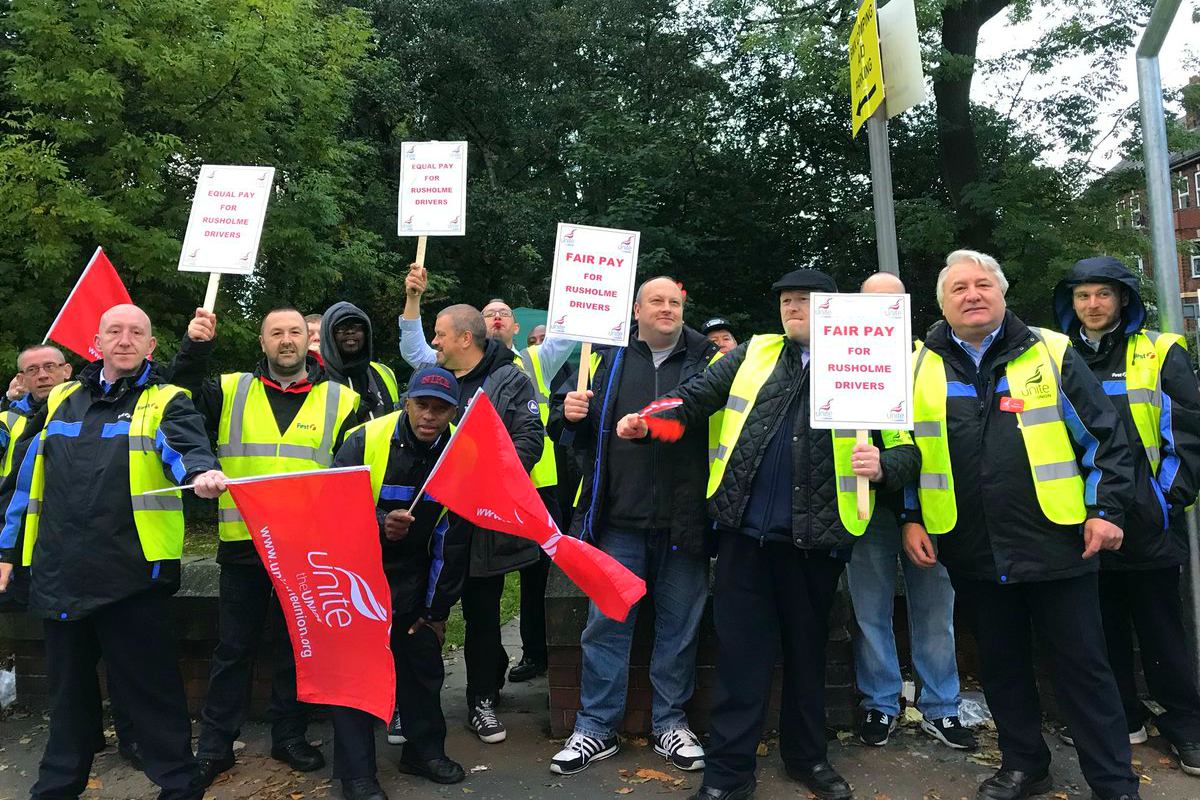Bus drivers at the Rusholme depot at First Manchester Ltd continued strike action on 20th November in an escalating industrial dispute over fair pay. Socialist Appeal supporters attended the picket line for the latest in a series of weekly 24-hour strikes. Nick Martin of the Manchester Marxists reports from the picket line of the striking bus drivers.
Bus drivers at the Rusholme depot at First Manchester Ltd continued strike action on 20th November in an escalating industrial dispute over fair pay.
Socialist Appeal supporters attended the picket line for the latest in a series of weekly 24-hour strikes, beginning in October and now expanding to Mondays, Wednesdays and Fridays. We spoke to a Unite representative at the picket who told us why these workers had chosen to step up their fight.
The Rusholme drivers, who voted by an overwhelming 96% majority for strike action, are paid 23% less than workers at nearby First depots in Manchester, amounting to nearly £5,000 less a year.
The Rusholme route is the busiest in Europe. We were told that conditions on the route are crowded and stressful: “We are responsible for the lives and safety of 70 passengers,” yet the drivers are “undervalued and unrecognised”.
“The job we undertake is identical to that of our colleagues at other depots, with the same demands, pressures and hazards, and for the same employer; the only difference between us is the unjustifiable disparity in our rates of pay.”
This disparity has existed since First took over the depot four years ago and exists between them and other drivers on the exact same route. In response, drivers have also called for a boycott of First buses, in addition to striking.
Bosses intransigent
First has refused to negotiate – they say that the drivers have been given a fair deal and that the Manchester company is unprofitable. Phil Medlicott, Managing Director at First Manchester, has urged the drivers back to work and told them that there will be no improvement to the offer.
The First group, however, is the biggest bus company in the world and posted £284 million in profits in 2017 alone. It can afford to bring in expensive short-term replacements from elsewhere in the company, often former drivers who are now in management, who have their time, transport and hotel accommodation generously recompensed. Yet it claims that what amounts to just a 2% pay rise for just 71 workers is an unreasonable demand. “They are trying to starve us back to work.”
Drivers are already forced to work overtime far above their contracted hours, which is paid at normal flat rates but without the corresponding holiday pay and sick pay. This overtime, which the drivers have to rely on, has been withdrawn from the striking workers – a move which was denounced by the driver we spoke to as “blacklisting, which is illegal”.
Defiant mood
“You can’t afford to work here,” said one driver. “The company loses 4-5 drivers a month because they are not willing to pay enough wages,” causing the drivers and the service more and more strain.
Going without pay on the run up to Christmas, the driver went on to point to the hypocrisy of the bosses: “The fat cats in London live in a different world… they do their Christmas shopping in Harrods.”
He said that the bus route would function better under workers control: “most of these managers have never stepped on a bus.” These “bean counters” refuse to understand that “without the drivers, no one gets paid…We bring in the money. Lets see what would happen if we were to just sit in the canteen all day…watch the money from electronic payments roll in then.”
He spoke of the need to nationalise public transport; services have been “stripped bare by private ownership and run into the ground.”
The mood of the drivers is defiant. Their decision to increase strike action shows they will not back down easily. A Unite representative had this to say to workers across the transport industry and beyond: “Stand up for your right, because no else will stand up for you. The only thing these companies care about is profit. They want us to work more for cheaper and cheaper. Enough is enough.”






